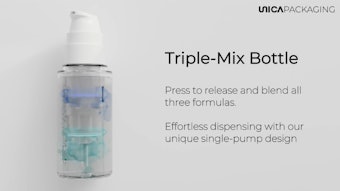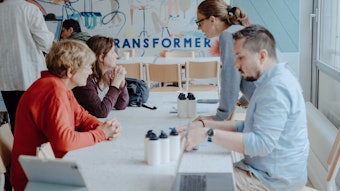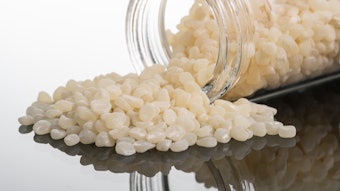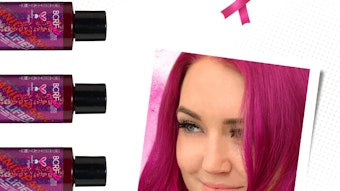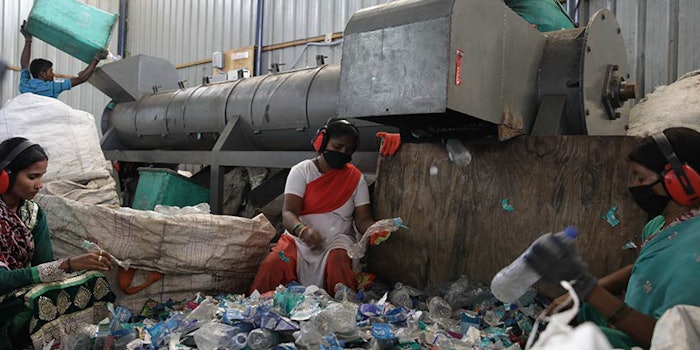
The Body Shop is teaming up with Plastics for Change, an organization dedicated to changing the social and environmental impact of plastic, for the latter’s Community Trade (CT) programs.
The Body Shop has agreed to buy recycled plastics collected by waste pickers in Bengaluru, India. The plastics will be introduced into the company’s packaging following a thorough renewal process, beginning with shampoo and conditioner bottles.
Interview: The Body Shop
UPDATE: In an exclusive interview with Global Cosmetic Industry, Pins Brown, head of ethical and sustainable sourcing at The Body Shop, discussed the project.
Global Cosmetic Industry: The Plastics For Change program appears to mimic similar ethical sourcing initiatives in the world of natural ingredients; what are the core principles for an ethically sourced plastics program?
Brown: In 1987, The Body Shop launched a program called Trade Not Aid, built out of the belief that business can be a force for good. That program is now called Community Trade and forms part of the DNA of The Body Shop. To date, we have sourced natural ingredients and accessories through this program.
We have over 30 years of experience in working with communities with limited resources around the world. We are bringing that experience to help address one of the world’s biggest issues today – plastic waste.
Whether talking about natural ingredients, accessories or recycled plastic, the core principles of our Community Trade program remain the same:
- Driving positive social change: Uncollected waste has given rise to an informal waste picking economy. Millions of people around the world earn a living picking up other peoples waste. But they earn very little doing so, and are often exploited. India has approximately 1.5 million waste pickers. We are buying used plastic from waste pickers in Bengaluru, India to include initially in our shampoo and conditioner bottles. In return, we provide waste pickers a fair price, a predictable income and an opportunity to improve their lives. We will support up to 2,500 waste pickers over the course of three
- Environmental sustainability: Waste pickers help fill the gap that current infrastructure can’t cope with. They form a key line of defence in preventing plastic from entering our rivers and oceans. This is The Body Shop’s commitment to tackling the plastic crisis differently – protecting the planet and helping to improve livelihoods at the same time. In 2019, we will buy 250 tonnes of Community Trade recycled plastic to use in nearly three million hair care bottles. The bottles will contain 100% recycled plastic (excluding the caps). 15% of that will be Community Trade recycled plastic, the remainder will be recycled plastic from European sources.
- Influencing other businesses: With any of our Community Trade programs, our aim is to help open the doors for other businesses to support the model. With Plastics For Change, we are introducing them to many of the stakeholders that we have relationships with. For example, through our support, Plastics For Change has been verified by the World Fair Trade Organization. They have also had the first investment from the World Vision Social Venture Fund.
In the first year, we are buying 250 tons of plastic, doubling that in 2020 and in three years we aim to buy over 900 tons.
Global Cosmetic Industry: What are the key challenges for the brand in terms of materials (consistency of quality, design limitations), price, etc.? To what degree can this program be scaled up?
Brown: We have been working with Plastics For Change on a very specific specification of plastic for The Body Shop – which is clear plastic PET bottles, to food grade standards. This is one of the key benefits that Plastics For Change brings to both the waste pickers and brands. They help train the waste pickers to understand the strict specifications that are needed for large scale production. Brands can then be assured of a consistent, high quality supply.
In the first year, we are buying 250 tons of plastic, doubling that in 2020 and in three years we aim to buy over 900 tons.
We need to scale responsibly, to ensure we are not overwhelming the small waste picker communities. Plastics For Change has scale up plans to apply their model to different cities, to ensure we can get our future plastic requirements.
Global Cosmetic Industry: What issues does this program solve for those working in the collection of plastic in India (the local workers)?
Brown: Through The Body Shop’s Community Trade program, we will support 2,500 waste pickers. This is just the start for us and we hope to expand the program. We not only aim to support the workers with a fair price, we also want to help raise awareness and visibility of the vital work the waste pickers do.
This lasting and meaningful change does not happen overnight. It takes time to build trust and communication with supply chain stakeholders. However, this initiative is raising the bar for the industry, inspiring other brands and manufacturers to also source recycled plastic responsibly.
The work that Plastics for Change, Hasiru Dala and Hasiru Dala Innovations does is key in implementing day to day change on the ground to ensure waste pickers' work is properly recognized, regulated and fairly paid and helping them to have access to education, healthcare and financial services.
Global Cosmetic Industry: How does the carbon footprint generally compare to other types of conventional and eco-friendly plastics programs? What are the sustainability upsides?
Brown: Even taking international transport into account we still save 1.8x CO2 compared to producing virgin plastic.
From a sustainability point of view, we believe this program provides a different way to address the plastic crisis. We see this as a supplementary initiative - a lot of companies are using oceans plastics in their product which is great. We are trying to work with waste pickers to pick plastic before it reaches our rivers and oceans. In doing so, we also want to support these communities.
We believe we need to work collectively to address the plastic crisis.
Global Cosmetic Industry: 2019 appears to be the year the world began to come to terms with packaging -- particularly plastic. What do you think that means for the future of large scale sustainability programs? How steady is the waste stream to support this type of sourcing?
Brown: There is an abundance of used plastic littering our planet. The Body Shop believes in using this plastic, which may otherwise end up in our rivers and oceans. We are working with Plastics For Change to scale up the supply in a responsible way and we are confident that we can continue to protect the planet while supporting communities at the same time.
Related: The Body Shop Urges Canadian Animal Testing Ban
About the Program
More than 3 billion people around the world live without formal waste management; in India, nearly a third of waste is uncollected, resulting in 1.5 million informal waste pickers. In Bengaluru, India, these pickers—largely consisting of Dalits, members of the lowest social group in the caste system—call themselves The Green Force.
The plastics collected by The Green Force are subject to high volatility, with prices dropping 60% in 2015 and, in the past six months, 23%, heavily impacting the livelihoods of the pickers. The trade between the organizations will support 2,500 waste pickers, providing Plastics for Change with a “fair price” for the waste material and a more stable income for those who pick.

